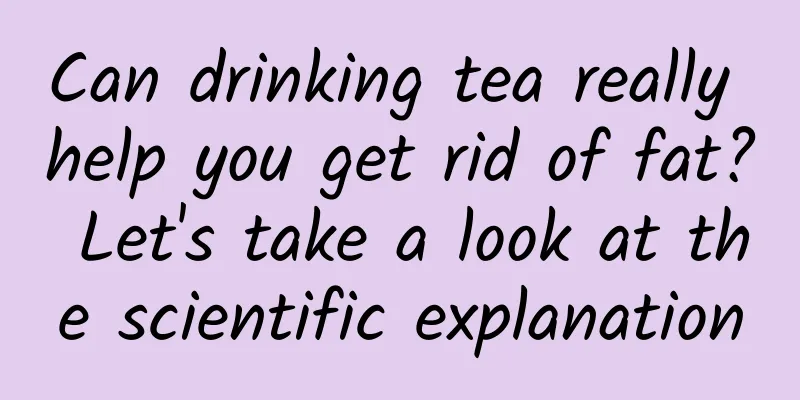Can drinking tea really help you get rid of fat? Let's take a look at the scientific explanation

|
After eating greasy food, drinking a cup of tea will instantly make you feel refreshed from mouth to stomach; if you drink too much tea, you will feel hungry after a while. These feelings after drinking tea have made many people agree that drinking tea can "shave off fat". How does drinking tea help digestion and relieve greasiness? If drinking tea can "shave off fat", does that mean drinking more tea can help you lose weight? As Qingming Festival approaches, many pre-Qingming teas are already on the market. We interviewed experts to reveal to you the reason why you tend to feel hungry after drinking tea, as well as how to choose high-quality spring tea. Feeling hungry after drinking tea does not mean losing fat Whether you feel hungrier after drinking tea or relieve the greasy feeling, it is the tea that has an effect on the gastrointestinal tract. Tea contains ingredients such as caffeine, theophylline and theobromine, which can stimulate gastric acid secretion and increase gastric motility. Increased gastric acid secretion and faster gastrointestinal motility help digest food, making people feel like they are burning fat and getting hungry faster. However, fat burning and hunger relief do not mean that drinking tea can remove fat or lose weight, because drinking tea only changes the process and feeling of digestion, not the result of digestion. Drinking tea can promote digestion, but it cannot consume calories. The energy that people eat three times a day, whether it is sugar, protein or fat, will not be consumed by drinking tea. Drinking tea only speeds up the digestion process. Pu'er tea and black tea stimulate gastric acid secretion more strongly than green tea, so drinking Pu'er tea makes you feel hungry more easily. Caffeine cannot accelerate metabolism. Some people try to use the stimulating effect of caffeine to infer the weight loss effect of tea: caffeine makes people excited, increases basal metabolic energy consumption, and thus can lose weight. In fact, caffeine can indeed make people more energetic and enhance athletic ability, but its effect on basal metabolism is very small. Therefore, tea, coffee, caffeinated drinks, etc. are not enough to achieve the goal of weight loss. One day, one year, one lifetime, you should drink different tea leaves The six major types of tea, including green tea, yellow tea, white tea, black tea, oolong tea, and dark tea, have very different flavors and ingredients due to different production processes. Academician Liu Zhonghua’s suggestion for drinking tea is: tea should be drunk alternately throughout the day, the year, and your lifetime. Green tea is an unfermented tea, white tea and yellow tea are slightly fermented teas, oolong tea is a semi-fermented tea, black tea is a fully fermented tea, and dark tea is a post-fermented tea. If we arrange the teas according to the degree of oxidation and fermentation from light to heavy, they would be green tea, white tea, yellow tea, oolong tea, black tea and dark tea. This order basically conforms to the order from cool to warm in traditional Chinese medicine. law Green in the morning and black in the evening When drinking tea, you can follow the rule from light oxidation to heavy fermentation. During the day, drinking a cup of green tea in the morning can make people more energetic. If you have a greasy meal at night, drinking a cup of black tea can aid metabolism. Throughout the year, people drink green tea and white tea, which are more irritating and relatively cool, to relieve the heat in the summer, and black tea and dark tea, which are less irritating and relatively warm, to warm the stomach in the winter. Throughout life, as we age, we will go from light oxidation to heavy fermentation: when we are young, we have better sleep quality, and drinking a cup of green tea with a higher caffeine content will not affect our sleep; in old age, we often "doze off while sitting and cannot fall asleep when lying down", so if we switch to black tea which is fermented by microorganisms and has a lower caffeine content, our sleep will not be affected too much. Of course, the above suggestions are not absolute and personal tea drinking preferences and physical differences need to be considered. Quantity 9~10 grams Drinking 9-10 grams of tea a day is considered a moderate amount, which can be brewed three times a day, morning, noon and evening. Studies have found that the health effects of tea also have a dose-effect relationship. If you want to get more health benefits from drinking tea, it is recommended to increase the amount of tea you drink appropriately. Overnight tea It's best not to drink Overnight tea does not cause cancer, but it is not recommended to drink it. A cup of tea that has been brewed for a long time will not have the fragrance and freshness it had when it was first brewed, but it is still drinkable and will not threaten health. However, from a hygienic point of view, it is not recommended to drink overnight tea. Experts teach you how to choose spring tea “Gold before the Ming Dynasty, silver after the Ming Dynasty, tea picking stops after the Grain Rain”, many people excessively pursue the early spring tea on the market in order to drink the first sip of freshness. In fact, the earlier the spring tea is picked, the better it is not necessarily. Spring tea has a fresh and refreshing taste and a rich and pleasant aroma. It can be said to be the best quality and taste of the year. In addition, there are few diseases and pests during the spring growth period, so the amount of pesticides used in spring tea is very small, and the pollution is even smaller. There is a saying about "spring tea" for various types of tea, and green tea, which is the most typical one, is the new tea. West Lake Longjing, Dongting Biluochun, Huangshan Maofeng, Xinyang Maojian, Taiping Houkui, etc. are all the best choices with good color, aroma and taste. Be careful when choosing spring tea. At a glance, spring tea leaves are generally tightly wrapped, have many hairs, and are bright in color and fragrant. Second, look at the color of the tea soup. Spring tea is fresh in color, and the soup is light green and clear after brewing. Old tea contains more theabrownin, and the tea soup is yellowish brown after brewing. The third grade tea fragrance, no matter which kind of spring tea it is, the taste is more mellow and refreshing, and the aroma is strong and lasting. Fourth, look at the tea leaves. The new tea leaves have a green tint with yellow and a bright color, with a distinctly fresh and tender feel. It is best to use a glass cup or a covered bowl to brew green tea. The tea leaves should be spread in a thin layer on the bottom of the tea set. The best water temperature for brewing tea is around 90 degrees. People with poor stomachs should be careful when drinking spring tea, because it contains a lot of unoxidized polyphenols, aldehydes, and alcohols. In addition, the caffeine content of spring tea is relatively high, which can cause great irritation to the stomach. Therefore, it is best to keep the spring tea you buy for half a month before drinking it. |
>>: Did higher education exist in the Warring States Period? Explore the origin of the Jixia Academy
Recommend
Watch is a powerful open source project abroad
Source code introduction: Watch is a powerful ope...
Asus ZenFone 6 review: large screen, Intel chip, 1,000 yuan
The screen size of ASUS ZenFone 6 is 6.0 inches, w...
"Transformation" and "crossover" under the new situation allow home appliances to better understand people's hearts!
Preface Affected by the novel coronavirus pneumon...
How to apply for a 400 phone number?
400 telephone is a service that shares the cost b...
Apple's ranking analysis | A major overhaul of the search association algorithm has wiped out the popular search rankings! WeChat points wall, meat brush, machine brush ASO intervention recovery...
Xiaomaowan Trial Points Wall Self-service Deliver...
What is the language of cherry blossoms? When do cherry blossoms usually bloom in Wuhan?
Cherry blossoms are bright and colorful with lush...
“Does artificial intelligence need to be like humans?”
Can machines think? Can artificial intelligence b...
How to achieve effective user retention? Share 6 tips!
When it comes to product growth, one thing that m...
7 things you do every day that accelerate the breakdown of your knees (not running)
Nowadays, exercise has become a "compulsory ...
Cao Yu Shoulder Training Baidu Cloud Download
Cao Yu shoulder training resource introduction: C...
The cause of hair loss has finally been found! Check here to see if it’s you (including tips on how to prevent hair loss)
What storms and waves have you never seen? But I&...
Public account operation: How to attract the audience’s scarce attention amidst an overabundance of content?
Official accounts are the only traffic pool in th...
Maria Goeppert-Meyer, the "Onion Madonna" who deciphered the structure of the atomic nucleus
February 20, 2022 marks the 50th anniversary of M...
iPhone India factory riots! Nearly 2,000 people smashed, looted and burned, employees said it was because of salary cuts
This article is reproduced from Leiphone.com. If ...
How to do a good job of Zhihu marketing for a brand?
Zhihu's commercial marketing system is curren...









